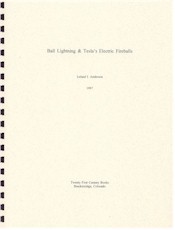Practically everyone has heard stories about this unusual electrical phenomenon. While they have mystified people for hundreds of years, they can now be produced at will and researchers are beginning to zero in on their true nature. This piece provides some background on the subject plus an overview of research which has resulted a few theories of the physics behind their creation. Included is the previously unpublished Chapter 34 of Prodigal Genius titled \"Tesla Tries to Prevent World War II.
Excerpt:
Ball lightning, spherical plasmoids, foudre sph?rique, and kugelblitz are some of the names given to luminous spheres which are sometimes seen during lightning storms accompanying cloud-to-ground strokes. Their reported size varies from that of a tennis ball to a basketball and persisting from a few to several seconds. They bounce on the ground and sometimes float in air. Published observations have appeared in the literature for 200 years, but an exact explanation of the mechanism of their formation is yet debated in the literature. Some of the very early accounts have perhaps given rise to the current divergence of opinion about their properties. One familiar early woodcut illustration shows a lightning fireball coming into a barn.
In 1883, Heinrich Hertz made an observation that every strong initial lightning discharge leaves a cloud which is luminous. Maximilian Toepler, reporting on a detailed series of experiments and observations, also concluded that ball lightning is attributed to the formation of a conductive gas channel after an initial lightning stroke in which an invisible weak after current occurs. At the point where a cloud-to-ground lightning discharge and a counter stroke from the ground meet, an afterglow in the form of ball lightning may occur. The ball disappears when the supply of current ceases or when a second cloud-to-ground lightning discharge occurs.



